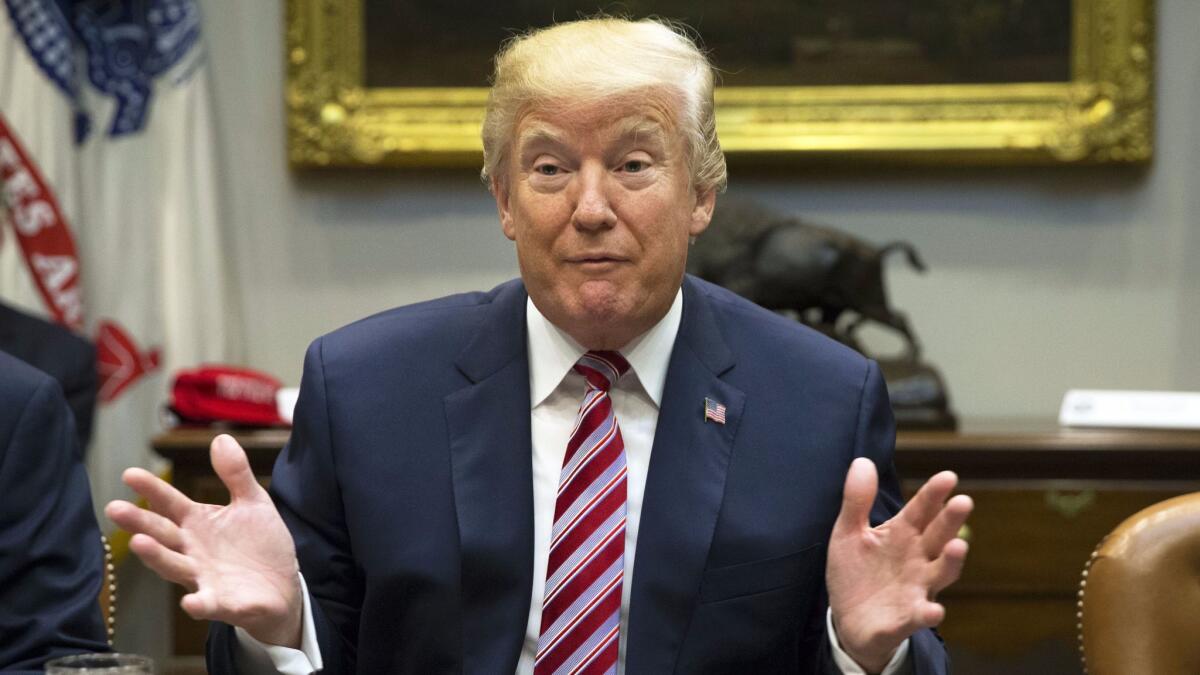Editorial: Trump is dangerously cutting corners in his quest to remake the Judiciary

Like presidents before him, Donald Trump sees his appointments to the federal courts as an important part of his legacy. But he is moving with unseemly haste to fill the 145 current vacancies — some of which exist only because the Republican-controlled Senate blocked former President Barack Obama’s nominees — and appears to be exalting ideology and partisanship over professional credentials.
So far four of those nominees have been rated “not qualified” by the American Bar Assn., including Brett J. Talley, the 36-year-old Justice Department official and former law clerk whom Trump picked for a federal district court in Alabama. Talley has practiced law for only a few years and never tried a case. On Monday it emerged that Talley didn’t mention in a Senate questionnaire that his wife is the White House counsel’s chief of staff, raising the possibility of a conflict of interest on any case involving Trump’s executive orders.
Past presidents have shared information about prospective judicial nominations with the ABA before nominations were announced so the bar group could make a confidential report to the White House. The president remained free to nominate a candidate the ABA deemed unqualified, but presidents tended to defer to the group’s conclusions. Obama reportedly decided against nominating more than dozen judicial candidates because of the outcome of an ABA investigation.
Trump needs to retool his approach to judicial selection. A good start would be to re-engage with the ABA.
The Trump administration, however, refuses to give the ABA advance information about potential judges. And now the administration might try to frustrate the ABA’s evaluations even after nominations are announced. According to the New York Times, the administration is considering advising future nominees not to submit to interviews by the association or sign confidentiality waivers that provide its evaluators access to disciplinary records.
The ABA isn’t infallible, but it has a record of evaluating prospective judges in a fair and bipartisan way. Evaluators from its Standing Committee on the Federal Judiciary conduct confidential interviews with people who worked with prospective nominees and then rate the candidates on the basis of experience, integrity and temperament. If it has a bias, it is in favor of litigators. Talley and another Trump nominee were rated “not qualified” because of their lack of “requisite trial experience or its equivalent.”
As for suggestions that the ABA is partisan or biased against conservatives, that idea is hard to reconcile with the fact that it has rated the vast majority of Trump’s nominees “qualified” or “well qualified.” The latter rating, the highest available, was bestowed on Neil Gorsuch, Trump’s nominee to the Supreme Court.
Further frustrating the ABA’s efforts to evaluate potential federal judges would be bad policy, but it also would perpetuate the partisan division in the Senate over judicial nominations that has led to the delay and sometimes the defeat of well-qualified nominees. Although both parties in the Senate have engaged in such obstruction, Republicans took it to a new and shameful level last year when they refused to consider Merrick Garland, Obama’s nominee for the seat long held by the late Antonin Scalia. Trump eventually appointed Gorsuch to that seat.
We’d like to think that this vicious cycle of partisan obstruction and retribution will come to an end, and the Senate would consider judicial nominees in a bipartisan way, confirming nominees if they were professionally qualified, ethically beyond reproach and within the broad mainstream of legal thinking. But that is less likely to happen if the White House rushes through nominations, fails to consult with home-state senators from the other party and attempts to exclude the ABA from its traditional role of evaluating candidates. (The Republican-controlled Senate Judiciary Committee has further marginalized the ABA by holding some nomination hearings before the bar association has completed its rating process.)
The Trump administration may think it can afford to ignore the concerns of Democrats and the legal community. Thanks to a change in the rules engineered by Democrats when they controlled the Senate, then expanded by Republicans, judicial nominees may not be filibustered. But Democrats can still exploit parliamentary procedures to slow the approval of the president’s nominees, and they can deprive those nominees of some of their legitimacy by refusing to vote for them.
For his own sake and that of future presidents — of both parties — Trump needs to retool his approach to judicial selection. A good start would be to re-engage with the ABA.
Follow the Opinion section on Twitter @latimesopinionand Facebook
More to Read
A cure for the common opinion
Get thought-provoking perspectives with our weekly newsletter.
You may occasionally receive promotional content from the Los Angeles Times.










